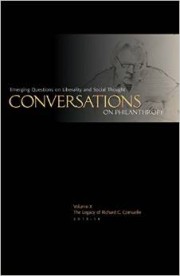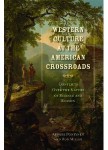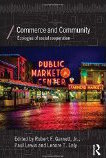The Future of Work
This collection of articles considers the future of work and the issues facing human labor in our era of rapid change. While policymakers have a role in building a proper scaffolding for workers, what role might philanthropy, business, and social entrepreneurs play in ensuring that the individuals of our society not only survive the transition, but thrive in the midst of it?
Gigs, Jobs, and Smart Machines
From e21
By Robert Graboyes
Graboyes defends the value of the gig economy based on the flexibility it affords the worker for learning and leisure. He suggests that employer-provided benefits act as a buttress to the employer-employee hierarchy and tether workers to corporate whims. For Graboyes, entrepreneurship is an escape from corporate paternalism, and the gig economy broadens access to its practice. He concludes by writing that, “By engaging in multiple activities and modulating the division of their efforts over time, they will no longer have to put all of their financial eggs in a single basket. They will have the flexibility to modulate their work enough to update skills on a continuous basis. In a sense, the Gig Economy transforms the division of labor from an interpersonal concept to an intrapersonal one.”
From Politico Magazine
By Danny Vinik
Vinik shines a light on the growing number of Americans employed in “alternative work arrangements” as employers forgo full-time employees in favor of independent contractors. While concerns mount over the changing nature of work due to off-shoring or automation, the current shift in the US labor market toward contract labor has repercussions that extend past wages and hours. “In America, more than any other developed country, jobs are the basis for a whole suite of social guarantees meant to ensure a stable life,” Vinik writes. Consequently, we’re looking at a large labor force—about 16 percent of workers—without basic job stability, health care insurance, or retirement benefits. In the essay, he calls policymakers to task to retool the “20th-century social contract to fit the labor market of the 21st century.”
Will Humans Go the Way of the Horses? Labor in the Second Machine Age
From Foreign Affairs
By Erik Brynjolfsson and Andrew McAfee
Brynjolfsson and McAfee examine the future of work from a historic perspective. Comparing the current technological revolution to transitions of the past, the authors consider whether human labor will be replaced by technology in the same way that automobiles replaced horses as a primary mode of transportation. Brynjolfsson and McAfee see human labor as offering unique contributions to an economy that can’t be replaced entirely by machines; nevertheless, they suggest that the future of work may be labor-lite as machines grow in their ability to create value. They conclude with a series of questions for policymakers to consider: “It’s time to start discussing what kind of society we should construct around a labor-light economy. How should the abundance of such an economy be shared? How can the tendency of modern capitalism to produce high levels of inequality be muted while preserving its ability to allocate resources efficiently and reward initiative and effort? What do fulfilling lives and healthy communities look like when they no longer center on industrial-era conceptions of work? How should education, the social safety net, taxation, and other important elements of civic society be rethought?”
If Work Dominated Your Every Moment Would Life be Worth Living?
From Aeon
By Andrew Taggart
Taggart considers Josef Pieper’s notion of total work; that is, a complete taskification of life. He paints a dreary picture of the total worker, who is constantly pressured to optimize his or her time for the sake of efficiency and productivity. The cost of total work, according to Taggart, is high: “For what is lost in the world of total work is art’s revelation of the beautiful, religion’s glimpse of eternity, love’s unalloyed joy, and philosophy’s sense of wonderment. All of these require silence, stillness, a wholehearted willingness to simply apprehend.”




